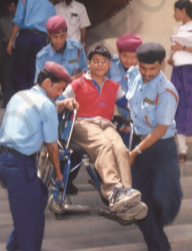NCERT Book Solutions Class 7 Social and Political Life – II Chapter 1
NCERT Solutions for Class 7 Civics Chapter 1 “On Equality” contains solutions to the exercises given in the “Social and Political Life – II”. These answers are created by subject experts and are as per the syllabus. Preparing from NCERT Solutions will help students in scoring high marks in the exam. Also, students will get to know how much to write for a particular question, depending on the mark allocation.
Students can download the NCERT Solutions for Class 7 Civics PDF below.
NCERT Solutions for Class 7 Civics (Social and Political Life – II) Chapter 1 On Equality
NCERT Solutions for Class 7 Civics Chapter 1 – On Equality
The solutions for Chapter 1, On Equality, are given below. Students should also check NCERT Solutions for Class 7 for other chapters.
Q.1 In a democracy, why is a universal adult franchise important?
Solution: In a democracy, a universal adult franchise is important, as it is based on the idea of equality. It states that every adult in a country, irrespective of wealth and the communities they belong to, has one vote.
Q.2 Read the box on Article 15 and state two ways in which the article addresses inequality.
Solution: Article 15 addresses inequality in terms of discrimination based on religion, race, caste, gender, place of birth, etc. It also addresses the fact that the use of public places such as wells, tanks, bathing ghats, and roads under full or partial government funding are not subject to discrimination based on the criteria mentioned above.
Q.3 In what ways was Omprakash Valmiki’s experience similar to that of the Ansaris?
Solution: Omprakash Valmiki was discriminated against on account of his caste, while the Ansaris were discriminated against on account of their religion. The core similarity is that they both were discriminated against because of their birth, which is prohibited under Article 15. Omprakash Valmiki was not allowed to sit with his fellow classmates on account of his birth as a Dalit and was made to sweep the school and its environs, thus hurting his dignity. The Ansaris were denied a flat to rent, as their religion differed from those of others, who were in the majority among the occupants of the apartment complex.
Q.4 What do you understand by the term “all personnel are equal before the law”? Why do you think it is important in a democracy?
Solution: The term “all persons are equal before the law” states that all citizens, irrespective of their social or economic background, have to obey the same laws. No person shall be discriminated against in the eyes of the law on the grounds of race, religion, caste or gender.
The very essence of democracy is the idea of equality, as it gives equality and recognition to all. It would never have existed in the first place if there were no inequalities on the basis of race, religion and gender, etc.
Q.5 The Government of India passed the Disabilities Act in 1995. This law states that persons with disabilities have equal rights and that the government should make possible their full participation. The government has to provide free education and integrate children with disabilities into mainstream schools. This law also states that all public spaces, including buildings, schools etc., should be accessible and provided with ramps.
Look at the photograph and think about the boy who is being carried with the stair. Do you think that the law stated above is being implemented in this regard? What needs to be done to make the building accessible?

Solution: It is evident that the boy in the photograph is disabled. As per the Disabilities Act 1995, the building should have been accessible to him. But the law is not being enforced here. In fact, it can be quite dangerous for him to be carried down by the security guards. To remedy this situation, the government can build a ramp along the stairs of every building. In this way, those with physical disabilities can have easy accessibility.
On Equality Summary
The NCERT Class 7 Social and Political Life – II Chapter 1 talks about the following topics:
- Equal Right to Vote
- Other Kinds of Equality
- Recognising Dignity
- Equality in Indian Democracy
- Issues of Equality in Other Democracies
- Challenge of Democracy
‘Social and Political Life – II’ is an important book for Class 7 Social Science subject. Apart from this chapter, the full set of NCERT Solutions for Class 7 Social Science is given in the linked article.
Frequently Asked Questions on NCERT Solutions for Class 7 Civics Chapter 1
What do you understand by the term “all personnel are equal before the law”, as learnt in Chapter 1 of NCERT Solutions for Class 7 Civics?
What will students learn from Chapter 1 of NCERT Solutions for Class 7 Civics?
Equal Right to Vote
Other Kinds of Equality
Recognising Dignity
Equality in Indian Democracy
Issues of Equality in Other Democracies
Challenge of Democracy
To learn more about these topics in detail, students can refer to the NCERT Solutions created by subject experts at BYJU’S.
List the advantages of using the NCERT Solutions for Class 7 Civics Chapter 1.
1. NCERT Solutions strictly adheres to the latest CBSE syllabus and guidelines.
2. Illustrations, diagrams and charts are included in the answers to aid visual learning.
3. All the solutions are available in PDFs that can be downloaded for free.
4. Fundamental Concepts are well explained in simple and understandable language.
5. Most reliable reference guide for exam preparation of students.


Good
It is realy a helpful app for study